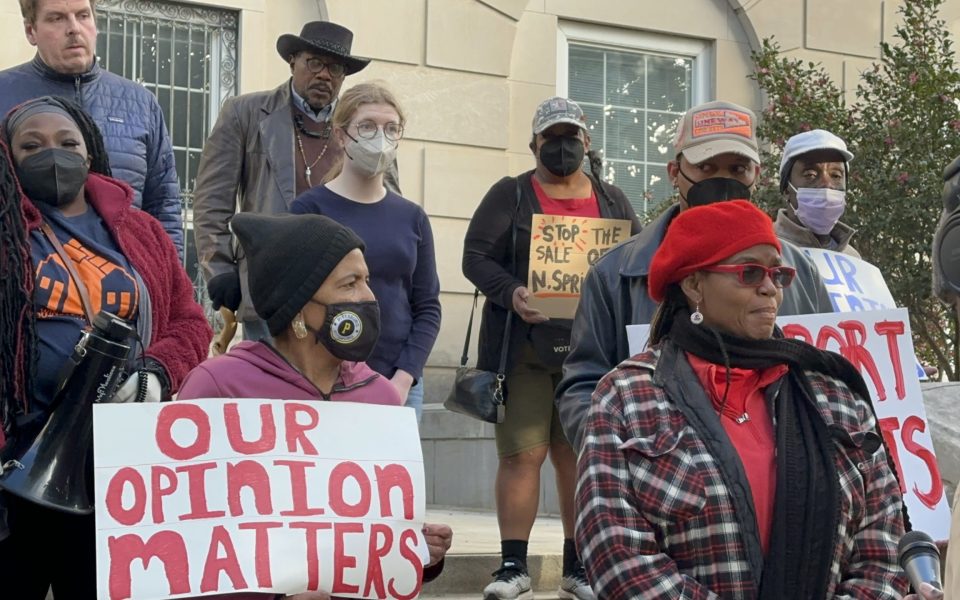Featured photo: Clifford Apartments residents and activists speak in front of city hall in Winston-Salem, Dr. Arnita Miles addresses the crowd on Jan. 8. (photo by Gale Melcher)
In the midst of the Great Depression, the federal government created the first iteration of housing voucher programs to help low-income residents afford places to live. Now, decades later, 5.2 million American households receive rental assistance, with approximately 2.3 million of those households receiving a housing choice voucher, according to the Center on Budget and Policy Priorities. Low-income families and elderly and disabled people are eligible for Section 8 housing choice vouchers.
In Winston-Salem, one developer hopes to secure those vouchers for the residents living in Clifford Apartments.
In November, local nonprofit organization Experiment in Self-Reliance sold Clifford Apartments to the city for $760,000, and in January, city leaders agreed to then sell the building for $600,000 to local developer Jared Rogers. Forsyth County Property Records notes that the eight-unit apartment building built in 1955 was sold to ESR in 1993 for $0.
How do Section 8 vouchers work?
Rogers told TCB that he hopes to secure Section 8 housing choice vouchers for his tenants in order to break even on the rent.
If a tenant qualifies for a Section 8 voucher, their rent and utilities could cost 30 percent of their income while the rest of the bill is footed by the local housing authority — here it’s the Housing Authority of Winston-Salem, or HAWS.
Legally, Section 8 tenants can’t pay more than 40 percent of their adjusted monthly income for rent. Rogers also agreed that the current tenants’ rent will stay the same through the end of 2025. Residents currently pay $580-675 in monthly rent.
“We’re looking at this as a gateway to doing more Section 8 housing,” Rogers told TCB. Rogers said that two tenants already have Section 8 vouchers and wants the other six to get them too.
Still, he “can’t predict each tenant’s situation.”

High demand, low supply
Due to the number of applicants, HAWS’s waiting list for the Housing Choice Voucher Program is currently closed.
In late January, when asked about the housing voucher waiting list status, HAWS’s Executive Director Kevin Cheshire replied to TCB that HAWS does “not currently have a projection on when the waiting list will be reopened.”
However, Rogers told city leaders in January that Cheshire assured him that he was “pretty confident” that the waiting list would be open within the next 12 months.
When TCB followed up with Cheshire to ask him about Rogers’ statement, his response was: “Unfortunately I’m not going to be able to comment on any private conversations that Mr. Rogers and I had.”
HAWS’s Vice President Kelly Church also told TCB in February that they do not know when the list will reopen. However, it will be open for three days once it does, Church said.
In January, Romonda Gaston, HAWS’s Housing Choice Voucher Program Director, said there are roughly 1,000 vouchers that are not in use right now. As of December, 3,382 of HAWS’s vouchers were leased — that’s 74.5 percent of their total 4,537. The state’s average is 81.2 percent.
Currently, 934 families are on HAWS’s waiting list for a housing voucher. In December, HAWS issued 23 vouchers. That means 23 families got off the waiting list and were given a maximum of 120 days to look for housing. Once those 120 days are up, those people will be “removed from the waiting list,” Gaston said. “They will have to re-apply whenever we reopen the waiting list.”
Also, 20 vouchers were leased in December.
During the same month in 2022, 35 families found housing with their vouchers. Last year’s highest month for vouchers leased was March, with 47.
The city’s lack of affordable housing might have something to do with HAWS’s low issuance rate. The city needs to build 15,000 units by 2027, according to a 2020 city staff report on affordable housing sites, with a goal of feeding 750 units into the city’s affordable-housing stock every year. At a housing meeting in January, the city’s Housing and Development Manager Tanya Skillman said that the city council approved 811 new construction units. On average, it takes 18-24 months to construct an apartment complex.
Learn more about the Housing Authority of Winston-Salem here.
All CityBeat reporting content is made possible by a grant from the NC Local News Lab Fund, available to republish for free by any news outlet who cares to use it. Learn More ↗
Republish this storyJoin the First Amendment Society, a membership that goes directly to funding TCB‘s newsroom.
We believe that reporting can save the world.
The TCB First Amendment Society recognizes the vital role of a free, unfettered press with a bundling of local experiences designed to build community, and unique engagements with our newsroom that will help you understand, and shape, local journalism’s critical role in uplifting the people in our cities.
All revenue goes directly into the newsroom as reporters’ salaries and freelance commissions.


Leave a Reply